Related Research Articles
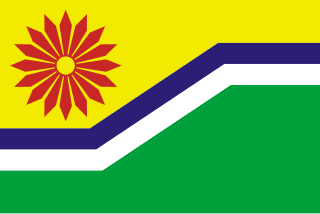
Mpumalanga is one of the nine provinces of South Africa. The name means "East", or literally "The Place Where the Sun Rises" in the Nguni languages. Mpumalanga lies in eastern South Africa, bordering Eswatini and Mozambique. It shares borders with the South African provinces of Limpopo to the north, Gauteng to the west, the Free State to the southwest, and KwaZulu-Natal to the south. The capital is Mbombela.
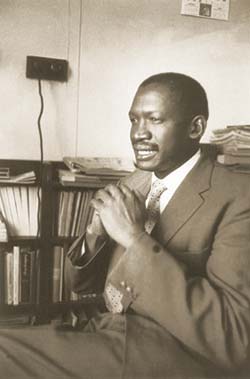
Robert Mangaliso Sobukwe OMSG was a South African anti-apartheid revolutionary and founding member of the Pan Africanist Congress (PAC), serving as the first president of the organization.
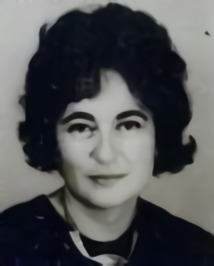
Heloise Ruth First OLG was a South African anti-apartheid activist and scholar. She was assassinated in Mozambique, where she was working in exile, by a parcel bomb built by South African police.
Bethal is a farming town in Mpumalanga, South Africa. The farms in the region produce maize, sunflower seeds, sorghum, rye and potatoes. The town lies 155 km (96 mi) east of Johannesburg on the N17 national route.
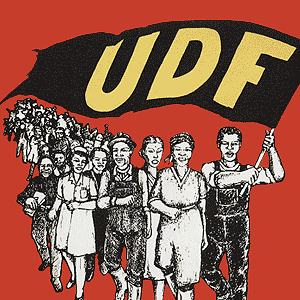
The United Democratic Front (UDF) was a South African popular front that existed from 1983 to 1991. The UDF comprised more than 400 public organizations including trade unions, students' unions, women's and parachurch organizations. The UDF's goal was to establish a "non-racial, united South Africa in which segregation is abolished and in which society is freed from institutional and systematic racism." Its slogan was "UDF Unites, Apartheid Divides." The Front was established in 1983 to oppose the introduction of the Tricameral Parliament by the white-dominated National Party government, and dissolved in 1991 during the early stages of the transition to democracy.
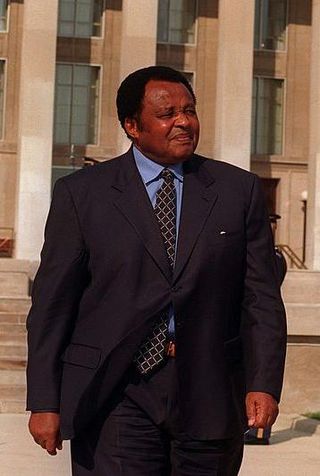
Johannes "Joe" Modise was a South African political figure. He helped to found uMkhonto we Sizwe, the military wing of the African National Congress, and was its longest serving Commander in Chief, deputised at different points in time by Joe Slovo and Chris Hani. Modise headed MK for a 25-year period, from 1965 to 1990. He served as South Africa's first black Minister of Defence from 1994 to 1999 and led the formation of the post-independence defence force.
The National Union of South African Students (NUSAS) was an important force for liberalism and later radicalism in South African student anti-apartheid politics. Its mottos included non-racialism and non-sexism.

Thomas Titus Nkobi was a senior leader of the South African African National Congress (ANC) and a key figure in the Anti-Apartheid movement. Until his death he was the Treasurer General of the ANC and also its Member of Parliament.
Zephania Lekoame Mothopeng was a South African political activist and member of the Pan-Africanist Congress (PAC).

Internal resistance to apartheid in South Africa originated from several independent sectors of South African society and took forms ranging from social movements and passive resistance to guerrilla warfare. Mass action against the ruling National Party (NP) government, coupled with South Africa's growing international isolation and economic sanctions, were instrumental in leading to negotiations to end apartheid, which began formally in 1990 and ended with South Africa's first multiracial elections under a universal franchise in 1994.
The 1957 Alexandra bus boycott was a protest undertaken against the Public Utility Transport Corporation (PUTCO) by the people of Alexandra in Johannesburg, South Africa.
Richard "Gert" Sibande was a South African political activist. He was one of the ANC co-accused to stand trial in the treason trial of 1956-61 alongside Nelson Mandela and 154 others.

The Congress Alliance was an anti-apartheid political coalition formed in South Africa in the 1950s. Led by the African National Congress, the CA was multi-racial in makeup and committed to the principle of majority rule.
Florence Grace Mkhize was an anti-apartheid activist and women's movement leader. Mkhize was usually called 'Mam Flo'. Mkhize was also involved in trade unions in South Africa, organizing for the South African Congress of Trade Unions (SACTU). From her teenage years, determined to be part of the solution of the apartheid, she joined the African National Congress (ANC). By the age of 20, Mkhize was already a full fledged activist.
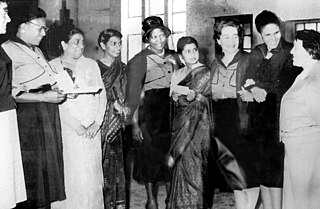
The Federation of South African Women (FEDSAW) was a political lobby group formed in 1954. At FEDSAW's inaugural conference, a Women's Charter was adopted. Its founding was spear-headed by Lillian Ngoyi.
Christina 'Chrissie' Jasson was a South African clerk and trade unionist from Port Elizabeth, who stood accused of treason at the Rivonia Trial.
Mary Thipe OLS (1917-1982) was a South African anti-apartheid and human rights activist who took part in the 1956 Women's March against apartheid pass laws, the South African potato boycott of 1959 and the Cato Manor Beer Hall boycott in the same year. Thipe was also the vice-chairperson of the Cato Manor branch of African National Congress Women's League (ANCWL) during the 1950s.
Florence Matomela OLG (1910–1969) was a South African anti-pass law activist, communist, civil rights campaigner, ANC veteran, teacher and mother who dedicated her life to fighting against Apartheid laws in South Africa. Matomela was the provincial organiser of the African National Congress Women's League (ANCWL) and vice-president of the Federation of South African Women (FEDSAW) in the mid 1950s.

South Africa–Sweden relations refers to the bilateral relations between Sweden and South Africa. Formal relations between the two countries began with the opening of a South African legation in the 1930s with relations being upgraded to ambassadorial level in 1994 following South Africa's first non-racial democratic elections. In 2000 a South African - Swedish Binational Commission was established by President Thabo Mbeki and Prime Minister Göran Persson.

Devikarani Priscilla Sewpal Jana was a South African human rights lawyer, politician and diplomat. As a member of the African National Congress (ANC) during the anti-apartheid movement, she participated in both legal activism as well as in the underground movement to end apartheid. She represented many significant figures in the movement, including South African president Nelson Mandela, Winnie Madikizela-Mandela, Steve Biko, Govan Mbeki, Walter Sisulu, and Archbishop Desmond Tutu. Jana was one of the very few South Africans who had access to political prisoners, including Mandela, in the maximum security Robben Island prison, and served as an emissary for coded messages between the political prisoners and the ANC leadership.
References
- 1 2 "Don't eat potatoes! | South African History Online". www.sahistory.org.za. Retrieved 24 July 2017.
- 1 2 3 "50th Anniversary of the Potato Boycott – Satyagraha in Pursuit of Truth". www.satyagraha.org.za. Retrieved 24 July 2017.
- ↑ Don Pinnock (2014) Building an alternative consensus for political action:Ruth First as journalist and activist, Review of African Political Economy, 41:139, 97–104, DOI:10.1080/03056244.2014.878079 Accessed 24 July 2017
- ↑ "Anti-Apartheid Movement Archives - Forward to Freedom". www.aamarchives.org. Retrieved 25 July 2017.
- 1 2 Mac Maharaj. Reflections in Prison. African National Congress. Zebra, 2001. pg 170
- ↑ "SACTU launches a national potato boycott. | South African History Online". www.sahistory.org.za. Retrieved 25 July 2017.
- ↑ Belinda Bozzoli. Explaining Social Consciousness: The Case of Mrs. Molefe (Expliquer la prise de conscience: le cas de Mrs. Molefe) Cahiers d'Études Africaines Vol. 31, Cahier 123 (1991), pp. 287–306 Published by: EHESS Stable URL: https://www.jstor.org/stable/4392330 Accessed 25 July 2017
- ↑ "SACTU launches a national potato boycott. | South African History Online". www.sahistory.org.za. Retrieved 24 July 2017.
- ↑ "Anti-Apartheid Movement Archives - Forward to Freedom". www.aamarchives.org. Retrieved 24 July 2017.
- ↑ "Frances Baard". The Solomon. Retrieved 1 January 2024.